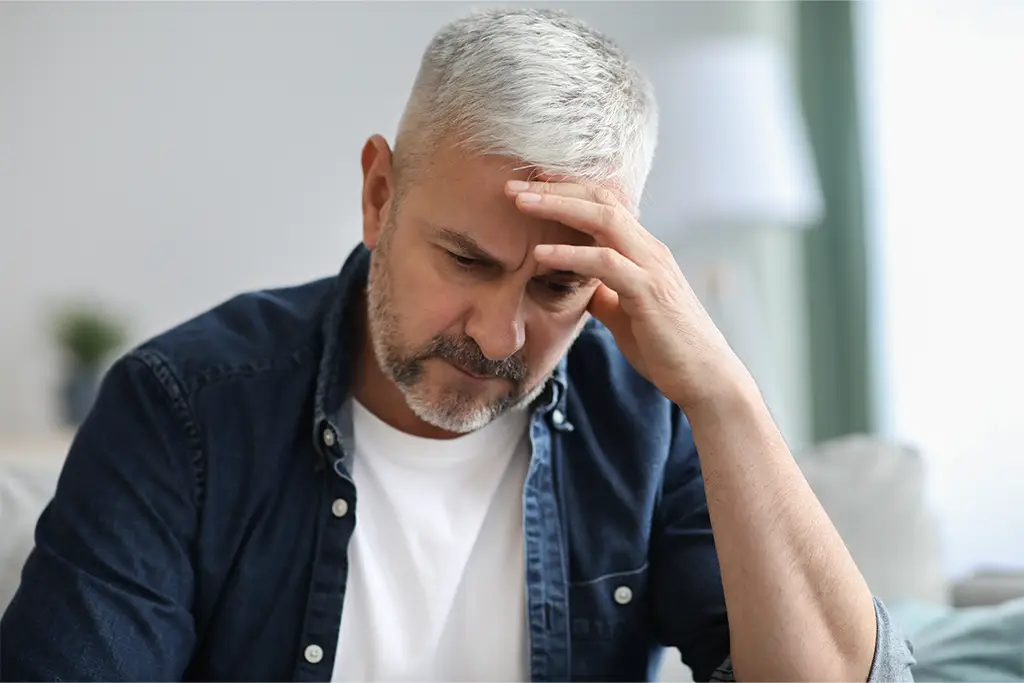What Are the Causes of Male Menopause?
The following are the key causes of male menopause:
● If the testicles are injured or infected, it can damage the Leydig cells, which make testosterone.
● Testosterone levels drop normally as people age, beginning around age 30.
● Being overweight, having diabetes, or having high blood pressure can all stop your body from making testosterone.
● A lot of medicines, like opiates, corticosteroids, and some cancer drugs, can lower testosterone levels.
● Producing hormones that increase testosterone output is the job of the pituitary gland. Low testosterone levels can happen if the pituitary gland isn’t working right.
● Poor diet, lack of exercise, and excessive stress can also play a role in hormonal changes.
What Are The Symptoms of Male Menopause?
The symptoms of male menopause often show up in older men whose testosterone levels are dropping. Still, they also happen a lot in older men who have heart disease, obesity, high blood pressure, or type 2 diabetes.
Indications of Low Testosterone:
● Lowered sex drive (libido)
● Erectile dysfunction
● Trouble sleeping
● Fatigue
● Loss of muscle mass
● Gained body fat Mood swings or anger
● Trouble focusing on Breast enlargement (gynecomastia)
Men who have low testosterone levels may show all the signs. Additionally, the above symptoms can be caused by other things, so it is crucial to see a doctor to obtain a diagnosis.
Some other risk factors are underlying health issues like
● Less exercise
● Smoking
● Addiction to alcohol
● Lack of sleep
● Stress
● Worry
What Are the Treatment Options for Male Menopause?
Andropause, which is another name for male menopause, is usually treated with a mix of lifestyle changes, hormone replacement treatment, and other methods. The goal of treatment is to ease the symptoms and fix the chemical problems that are causing them. Here are some popular ways to treat menopause in men:
- Hormone Replacement Therapy (HRT): This therapy raises hormone levels and helps with complaints like tiredness, low libido, and mood swings. This should only be done with the help of a medical professional to make sure it is safe and useful.
- Changes in Lifestyle: Promoting healthy habits like regular exercise, a balanced diet, stress management, and getting enough sleep can help improve general health and ease some of the symptoms of male menopause.
- Medicines: Sometimes, medicines are recommended to help with certain symptoms like impotence, depression, or trouble sleeping. These medicines should only be taken as your doctor tells you to.
- Support and guidance: Getting mental health help, like therapy or counselling, can help with the emotional and mental parts of menopause in men, especially if they are having mood swings or depression.
- Checkups with your doctor: It’s important to see your doctor regularly to check your hormone levels, look at your general health, and make any necessary changes to your treatment.
It is very important for men who are showing signs of male menopause to see a doctor so that they can get a correct diagnosis and a treatment plan that fits their needs and health.
Conclusion
Male menopause is treated by making symptoms better and generally making the person healthier. For example, you could get hormone replacement treatment, change your lifestyle by eating better and working out more, take your medications, and talk to someone about how you feel.
Schedule regular visits with your doctor to check on your hormone levels and make any necessary treatment changes. Male menopause symptoms can be managed, and older men can live a healthy life with the right help. Contacting your doctor for help and support is important at this time.

